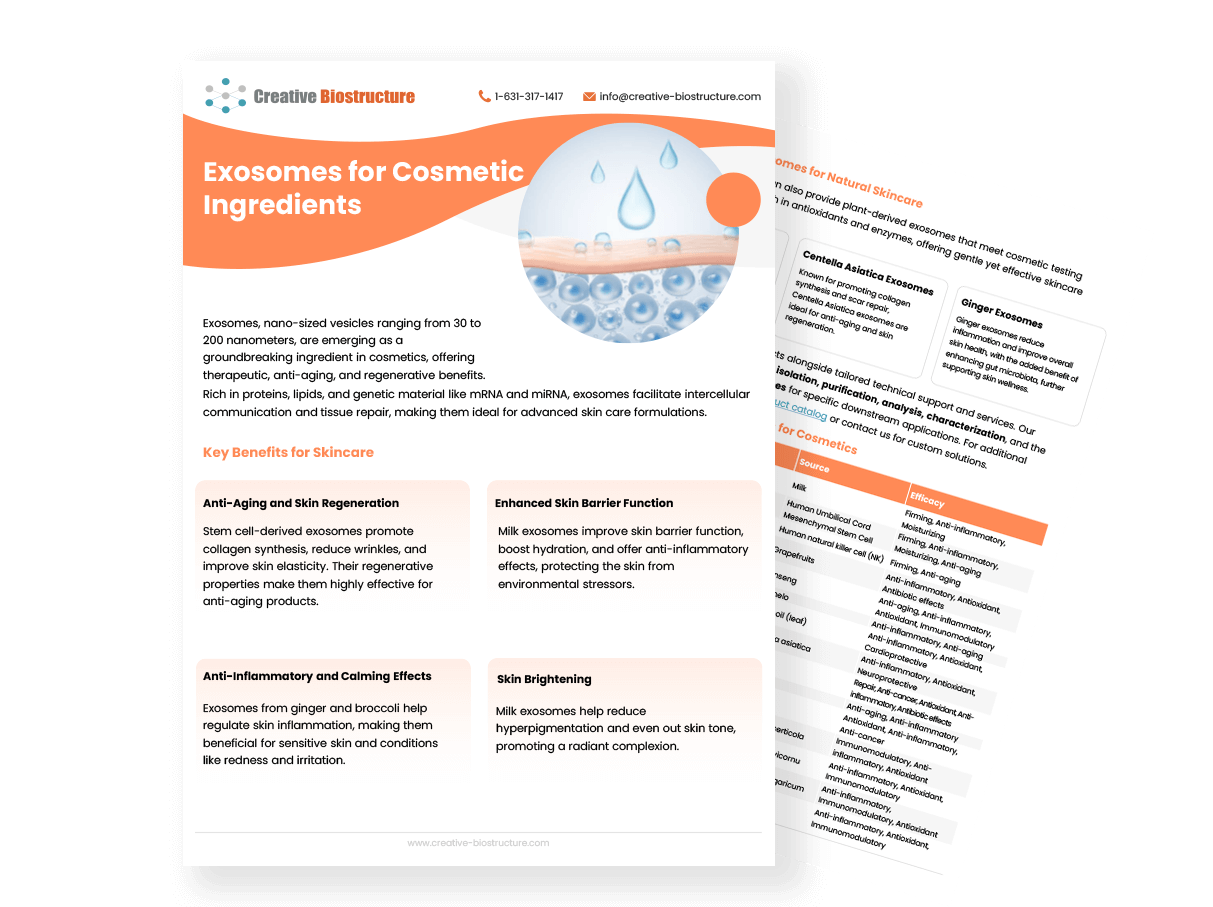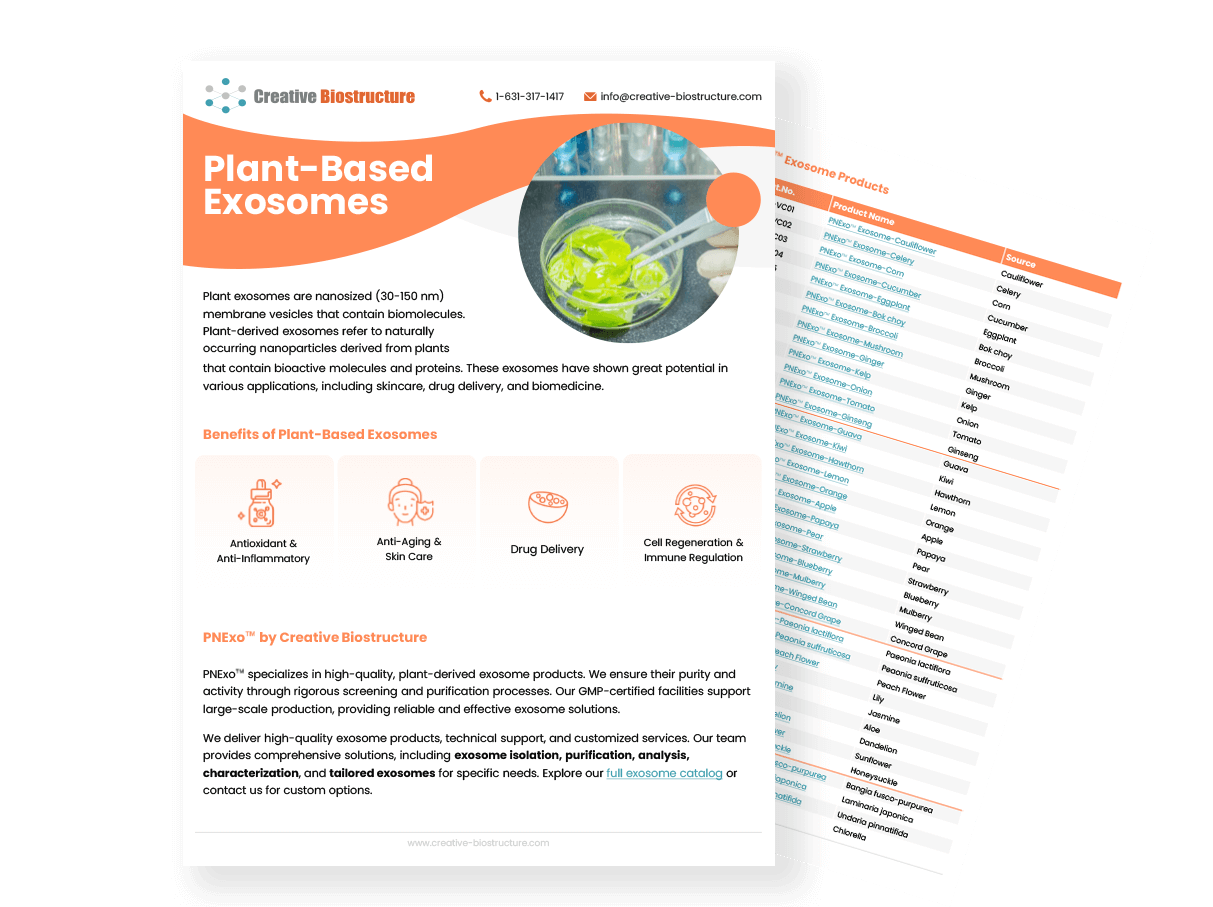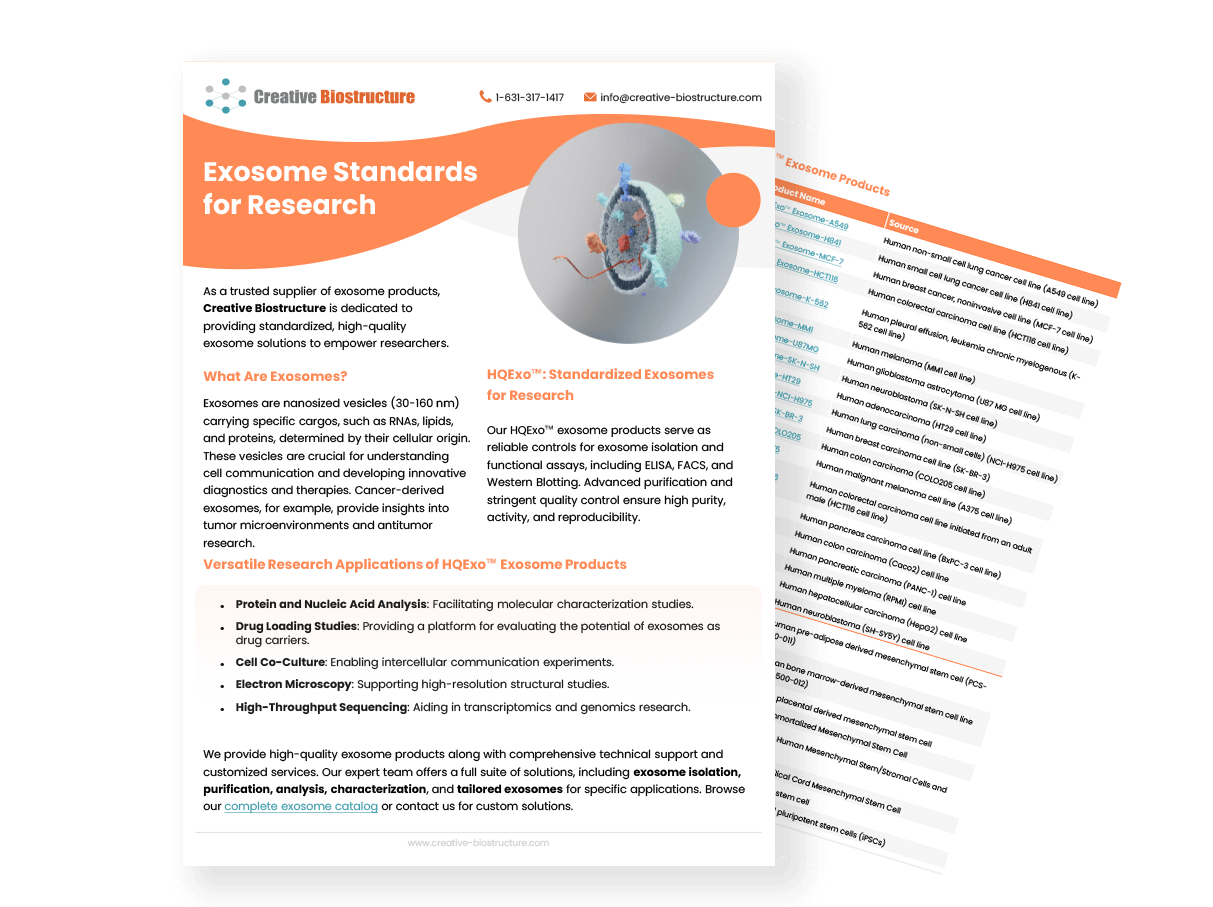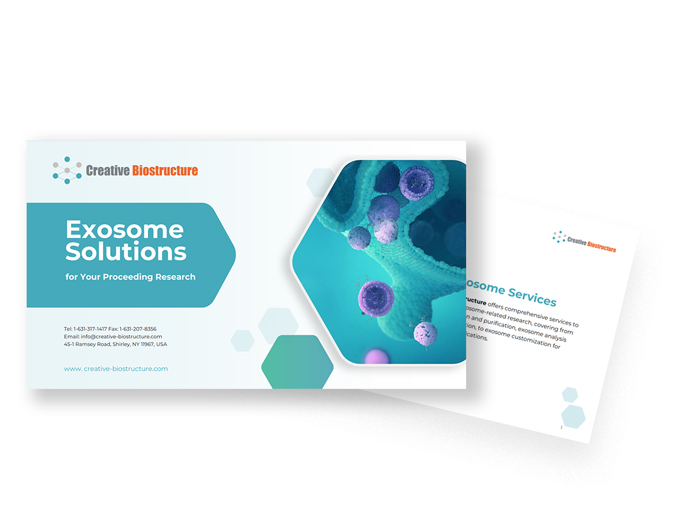Exosomes for Cosmetics
The small extracellular nanovesicles exosomes, released by cells, are now gaining attention for cosmetics, skin care, tissue regeneration, and treatment of dermatological diseases. Exosomes for cosmetics function by changing the cellular microenvironment, gene expression, and cell differentiation. Therefore, they can be used to reduce wrinkles, soften and moisturize the skin, increase elasticity, and reduce inflammation and UV damage.
Creative Biostructure provides cosmetic grade exosomes from human umbilical cord mesenchymal stem cells (hMSC) (CosExo™ Exosome-hMSC) and milk exosomes (CosExo™ Exosome-Milk) for cosmetic applications. hMSC-derived exosomes contain growth factors, cytokines, and microRNAs that can rejuvenate aging skin. These exosomes increase collagen production, which is necessary to keep skin elastic and reduce wrinkles. They also tone and smooth the skin, lighten dark spots and promote skin wellness. Similarly, milk exosomes possess many cosmetic effects ranging from fighting the signs of aging, smoothing skin texture, protecting skin barrier and soothing the skin. Both exosomes can be added to creams, serums, masks and lotions.
In response to the rising demand for plant-based cosmetic ingredients, Creative Biostructure has broadened exosome portfolio to include high-performance exosomes derived from select botanicals, offering new opportunities for sustainable skincare formulations. These plant-derived exosomes—rich in natural antioxidants and bioactive compounds—exhibit strong skin-soothing, anti-inflammatory, and regenerative properties. For example, exosomes extracted from traditional herbal sources such as Centella asiatica (PNExo™ Exosome-Centella asiatica) or turmeric (PNExo™ Exosome-Turmeric) have shown promising effects in promoting skin repair, reducing oxidative stress, and enhancing overall skin tone and texture.
Product List
Background
Exosomes are increasingly recognized in cosmetics as potent therapeutic and anti-aging agents, and are therefore sought-after constituents in topical creams, serums and masks. These small vesicles contain proteins, lipids and bioactive molecules that play a crucial role in promoting skin healing, hydration and protection, making them a versatile addition to skin care. Through their activation of collagen, anti-inflammatory activity, and environmental stress-reducing properties, exosomes help maintain healthy skin.
In addition to their own properties as delivery carriers, exosomes can also help other active components (e.g., hyaluronic acid and antioxidants), absorb better into the skin and work better. Exosomes from adipose and bone marrow stem cells can significantly reduce reactive oxygen species (ROS) and inflammatory markers, as well as improve collagen production and skin elasticity.
Further, exosomes were reported to repair sunburn and acne scars, repopulate skin cells and even out the complexion. Because they maintain skin barrier repair and hydrate the skin, they're an innovative wrinkle fighter. And since exosomes are so versatile, they can be very useful for a range of sophisticated, targeted skin care products that can address various areas of skin health and aging.
 Figure 1. Role of exosomes for anti-aging treatment. The administration of Adipose stem cell derived-condition media (ASC-CM) and Bone marrow stem cell derived exosomes (BMSC-exos) had the effect of decreasing the production of reactive oxygen species (ROS) to a low level, decreasing the expression of tumor necrosis factor-alpha (TNF-α) but increasing the expression of transforming growth factor-beta (TGF-β), leading to an increase in the production of matrix metalloproteinase-1 (MMP-1) and pro-collagen type I, which ultimately enhanced the synthesis of collagen in the skin, improving its elasticity and reducing the appearance of wrinkles, making it an effective anti-aging therapy. (Thakur A, et al., 2023)
Figure 1. Role of exosomes for anti-aging treatment. The administration of Adipose stem cell derived-condition media (ASC-CM) and Bone marrow stem cell derived exosomes (BMSC-exos) had the effect of decreasing the production of reactive oxygen species (ROS) to a low level, decreasing the expression of tumor necrosis factor-alpha (TNF-α) but increasing the expression of transforming growth factor-beta (TGF-β), leading to an increase in the production of matrix metalloproteinase-1 (MMP-1) and pro-collagen type I, which ultimately enhanced the synthesis of collagen in the skin, improving its elasticity and reducing the appearance of wrinkles, making it an effective anti-aging therapy. (Thakur A, et al., 2023)
Differentiating Plant and Animal-Derived Exosomes
While both plant-derived and animal-derived exosomes share similar biological functions, they present distinct advantages for cosmetic use.
- Plant-derived exosomes are rich in botanical nutrients and natural polyphenols that exhibit strong antioxidative and protective effects. They are ideal for gentle, natural skincare formulations. Their biocompatibility and lower allergenicity make them an appealing choice for sensitive skin applications.
- Animal-derived exosomes, such as those from hMSCs, milk, or NK cells, are more regenerative in nature, promoting collagen synthesis, cellular renewal, and intensive skin repair. These exosomes are preferred in high-performance cosmeceuticals that aim for rapid anti-aging and skin remodeling effects.
Applications of Exosomes for Cosmetics
Anti-Aging Effect
Exosomes from hMSC and milk promote collagen production, repair skin, and reduce wrinkles by delivering growth factors and antioxidants. Plant-derived exosomes, such as from Centella asiatica and turmeric, offer a natural anti-aging boost by neutralizing free radicals and supporting skin renewal for a firmer, youthful look.
Skin Barrier Protection
hMSC and milk-derived exosomes help strengthen the skin barrier, reduce irritation, and improve resistance to environmental damage. Plant exosomes, such as those from sea-buckthorn and olive leaf, deliver natural compounds that soothe the skin, reinforce barrier integrity, and protect against UV and pollution.
Skin Brightening
Animal-derived exosomes reduce melanin production and fade dark spots by inhibiting tyrosinase, leading to a more even skin tone. Plant-based exosomes, like those from grapefruit and forsythia, gently brighten the skin using natural depigmenting agents—ideal for clean beauty formulations targeting dull or uneven skin.
Case Studies
Case Study 1: Skin Brightening Potential of Adipose-Derived Stem Cell Exosomes: Inhibitory Effects on Melanin and Clinical Efficacy
The skin whitening capabilities of exosomes from human adipose tissue mesenchymal stem cells (ASC-exosomes) are explored. Exosomes purified by tangential flow filtration reduced melanin in melanoma cells and were used in a placebo-controlled split-face experiment with hyperpigmented volunteers. Results showed a significant decrease in melanin content compared to placebo, though effects decreased over time, suggesting a need for improved delivery methods. Findings support ASC-exosomes as promising cosmeceuticals for skin brightening applications.
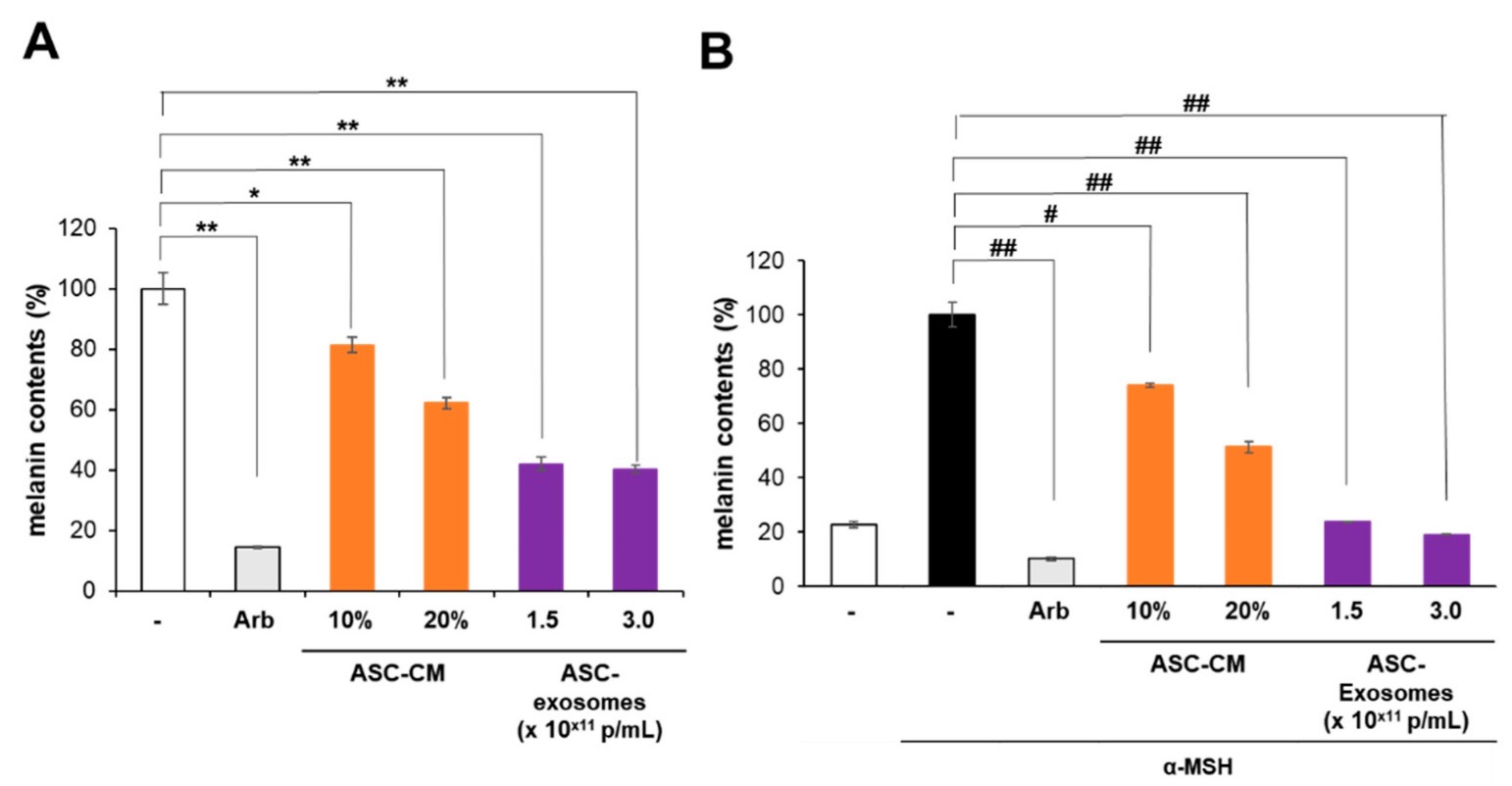 Figure 2. The anti-pigmentation effect of ASC-exosomes in the absence and presence of α-melanocyte-stimulating hormone (α-MSH). The melanin levels in B16F10 melanoma cells were measured after treatment with ASC-exosomes in the (A) absence or (B) presence of α-MSH for 48 h. Representative data are presented as the mean ± SD from multiple experiments performed in triplicate. (A) * p < 0.05 and ** p < 0.01 vs. the negative control group were considered statistically significant. (B) # p < 0.05 and ## p < 0.01 vs. the α-MSH control group were considered statistically significant. Arb: arbutin. (Cho BS, et al., 2020)
Figure 2. The anti-pigmentation effect of ASC-exosomes in the absence and presence of α-melanocyte-stimulating hormone (α-MSH). The melanin levels in B16F10 melanoma cells were measured after treatment with ASC-exosomes in the (A) absence or (B) presence of α-MSH for 48 h. Representative data are presented as the mean ± SD from multiple experiments performed in triplicate. (A) * p < 0.05 and ** p < 0.01 vs. the negative control group were considered statistically significant. (B) # p < 0.05 and ## p < 0.01 vs. the α-MSH control group were considered statistically significant. Arb: arbutin. (Cho BS, et al., 2020)
Case Study 2: Enhancing Peptide Skin Care with NanoGlow: Plant-Derived Exosomes for Superior Skin Penetration
Peptides are valuable for skin care, but often face challenges with stability and skin absorption. The NanoGlow technique addresses these limitations by encapsulating peptides in engineered nano-sized plant-derived exosomes (pExo) to enhance skin penetration and efficacy. Acting as carriers, pExo facilitate the delivery of peptides across the skin barrier, thereby improving their bioavailability. In vitro and in vivo studies show that pExo significantly outperform free peptides in reaching the dermis and promoting skin health. NanoGlow offers a scalable, stable solution for advanced peptide delivery with potential for both cosmetic and medical applications.
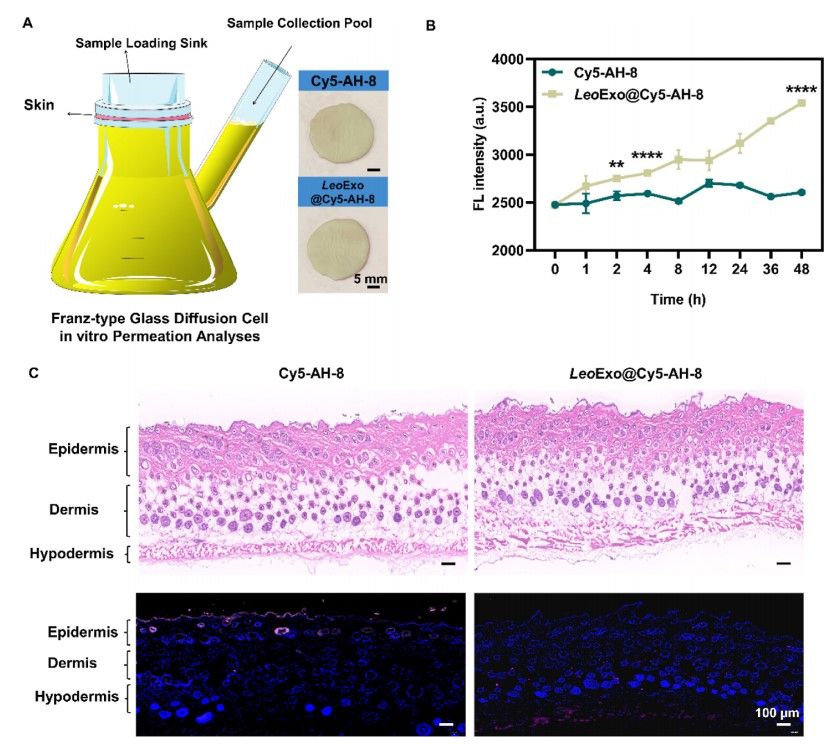 Figure 3. Evaluation of skin permeation potential for acetyl hexapeptide-8 (AH-8), LeoExo@AH-8, and milkExo@AH-8 in vitro and in vivo. (A) Fluorescent microscopy images of HaCaT cells following 1, 2, 4, and 6 h of incubation with free FITC-AH-8, LeoExo@FITC-AH-8, and milkExo@FITC-AH-8. Scale bar: 100 μm. (B) FL intensity corresponds to the absorption of various substances. (C) Schematic diagram of the in vivo test of the skin permeation ability using mouse back skin. (Hou J, et al., 2024)
Figure 3. Evaluation of skin permeation potential for acetyl hexapeptide-8 (AH-8), LeoExo@AH-8, and milkExo@AH-8 in vitro and in vivo. (A) Fluorescent microscopy images of HaCaT cells following 1, 2, 4, and 6 h of incubation with free FITC-AH-8, LeoExo@FITC-AH-8, and milkExo@FITC-AH-8. Scale bar: 100 μm. (B) FL intensity corresponds to the absorption of various substances. (C) Schematic diagram of the in vivo test of the skin permeation ability using mouse back skin. (Hou J, et al., 2024)
Product Advantages
- Improved Penetration and Efficacy: Exosomes act as natural nano-carriers that penetrate deep into the skin, delivering active ingredients where they’re needed most. This enhances the effectiveness of anti-aging, brightening, and repairing ingredients for visibly firmer and smoother skin.
- Bio-compatible and Natural Ingredients: Our exosomes closely mimic the body’s natural cellular processes, minimizing the risk of irritation. They provide a safe and biocompatible solution for skin rejuvenation, making them ideal for sensitive skin, vegan formulations and clean-label cosmetic products.
- Expertise in Plant-Derived Exosomes: We have developed mature, cosmetic-grade extraction protocols for plant-derived exosomes. With GMP-grade (A+C) cleanroom facilities, we offer customized extraction services for a wide range of botanical sources, ensuring high quality, safety, and flexibility in formulation.
- Advanced Lyophilization Technology: We offer mature lyophilization processes for exosomes, enabling flexible supply in either liquid or freeze-dried powder form. This ensures product stability and allows us to meet diverse formulation and packaging needs based on customer requirements.
- Customizable and Scalable Solutions: Leveraging exosomes as effective carriers for active ingredients, we provide exosome isolation services tailored to enhance your cosmetic formulations. Address targeted skin concerns, from anti-aging and hydration to repair and rejuvenation, with precision-engineered exosomes.
Resources
Frequently Asked Questions
-
Are your exosomes derived from natural or synthetic sources?
Our exosomes are derived from natural sources, such as human stem cell derivatives and milk, to ensure skin care compatibility and efficacy. We prioritize natural, biocompatible sources to align with the body's cellular processes, minimize irritation and promote optimal skin health.
-
How can exosomes be introduced to existing product lines?
Exosomes are adaptable, they can be added to creams, serums, masks and lotions. They are nanosized and therefore easy to incorporate into other formulations. We provide customized exosomes that can be fit into your existing line and deliver performance without compromising the stability of the formulation.
-
Is your exosome for cosmetics safe and compliant with industry standards?
Absolutely. Creative Biostructure makes sure all exosome products comply with cosmetics regulations. Our products are safe, highly purified, and non-toxic. We are GMP compliant and have stability and safety testing to ensure that the product we provided is safe and potent for cosmetic application.
Experience the skin care revolution of tomorrow with Creative Biostructure today and experience the shift toward smoother, brighter, and healthier skin. Contact us now!
References
- Cho BS, Lee J, Won Y, et al. Skin brightening efficacy of exosomes derived from human adipose tissue-derived stem/stromal cells: a prospective, split-face, randomized placebo-controlled study. Cosmetics. 2020;7(4):90.
- Hou J, Wei W, Geng Z, et al. Developing plant exosomes as an advanced delivery system for cosmetic peptide. ACS Appl Bio Mater. 2024;7(5):3050-3060.
- Thakur A, Shah D, Rai D, et al. Therapeutic values of exosomes in cosmetics, skin care, tissue regeneration, and dermatological diseases. Cosmetics. 2023;10(2):65.
- Wu X, Shen J, Zhong Y, et al. Large-scale isolation of milk exosomes for skincare. Pharmaceutics. 2024;16(7):930.
